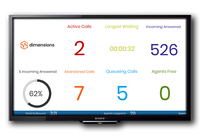e-911 and Kari's law: Implications for businesses
Kari's Law (also known as H.R. Bill 582 and signed into law on February 16, 2018), requires businesses to enable direct-dial access to emergency services. Multi-line telephone systems (such as those in offices and hotels) require individual to first dial a prefix before they can call 911.
Calling 911 without a prefix
With Kari's lawin place, such telephone systems must have a default configuration enabling users to call 911 without a prefix. This means that users should be able to call 911 without dialing additional digits, prefix, postfix, code as well as trunk-access codes such as "9."
Real-time alerts
Furthermore, the law requires that multi-line telephone systems (MLTS) that can be configured to do so(without improvement to the software or hardware of the system) should send alerts to designated points of contact either to an outside location or within the building itself when an individual uses the system to call 911. This allows the building's management or anyone in charge of the phone system to check on the individual or room from where the 911 call was made.
Implications of Kari's Law
Although MLTS is traditionally regarded as circuit-switched telephone technology, IP-based systems are increasingly being used to support voice communications. It's essential that businesses and establishments that use hosted VoIP thoroughly understand and comply with Kari's Law.
However, this can be a hassle since most hosted VoIP providers are non-compliant. One of the only hosted options available that complies with e-911 and Kari's law is Audian's phone system.
Hosted MLTS are often used in hotels, government agencies, schools, hospitals, and office buildings. For businesses and agencies operating and managing MLTS in such environments, they must do so within the provisions of the statute.
"Improvement"
Such service providers must determine if their MLTS can be configured to comply with the mandates stipulated in Kari's Law, without improvements to the software or hardware of the system. Although the meaning of "improvement" is ambiguous, Congressional Records indicate that upgrades to the MLTS' core system or substantial upgrades requiring significant financial investments may be viewed as "improvements."
On the other hand, the addition of extra lines/extensions or minor software upgrades that improves the security of the system is not considered an "improvement."
Applicable state laws
Businesses and agencies should determine if there are applicable state laws with more rigorous requirements. State commissions and other local agencies with jurisdiction over emergency telephone communication may impose more stringent regulations, provided they are consistent with Kari's Law.
Penalty for Non-Compliance
Businesses that are knowingly and willfully non-compliant may have to pay fines of up to $10,000 and may be subject to additional penalties (of up to $500) for each day they are found not in compliance.
With the passing into law of H.R. Bill 582, more changes are expected with respect to MLTS regulations, especially as the FCC and Congress continue to address "E-911" issues. Congress has provided a two-year window for operators and owners of MLTSs to comply with Kari's Law. The two-year window begins from the date of H.R. Bill 582's enactment.
Since Kari's Law is now included within the Communications Act, it is the prerogative of the FCC to continue enacting rules that enforce it. Presently, the Public Safety & Homeland Security Bureau of the FCC is reviewing responses to a Notice of Inquiry released last year, which observed that most MLTSs do not communicate the location information or call-back of a 911 caller to Public Safety Answering Points.
Conclusion
In emergency situations, every moment counts and the ability of users to instantly get through to 911 services may mean the difference between life and death. That's why we're dedicated to helping you become compliant with Kari's Law.
We understand that reliable communications is a vital part of your business and that you need an advanced, dynamic and instantly scalable phone system that's custom-built to suit your every need.
Audian's communications solutions are built on the concept of "Telecompetence, "a construct that aims to provide the most efficient telecommunications systems and support to businesses, so they can concentrate on what really matters. Again, we reiterate, Audian's solution is one of the only hosted options that complies with both e-911 and Kari's law.
Our solutions offer advanced calling features including call forwarding, call identification, call waiting, and message waiting. Telephone calls, voice messages, and electronic message alerts are routed via wireless communications networks and the Internet, enabling businesses to have reliable, easy and modern phone solutions, so they can spend less time worrying about their communication technologies and more time on improving service delivery and customer satisfaction.
Our VoIP solutions also come with a unique feature that allows the generation and sending of emails, text and automated calls to alert the admin of an MLTS whenever someone makes a 911 call within their building/establishment.
In addition to our SMS and email alerts facilitating e911 services, we offer on-off-net DID provisioning, real-time registration, and update of e-911, comprehensive reporting of 911 history and usage data as well as testing and troubleshooting of e911 numbers to ensure they're working properly.
By taking advantage of Audian's "Telecompetence" construct, you'll be leveraging years of expertise in the Voice and Unified Communications industry to ensure total compliance with e-911 and Kari's law.




